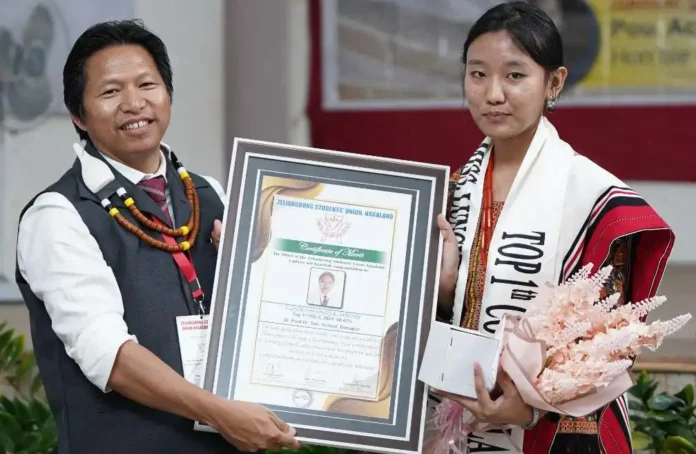Addressing the felicitation programme honoring meritorious students of the Zeliangrong community, chairman of SDPDB Bhandari and NLA chairman on Environment and Climate Change Committee, Achumbemo Kikon, MLA proposed a major shift in the state’s reservation policy—from job-based quotas to education-based support systems.
The event, organized by the Zeliangrong Students’ Union Nagaland (ZSUN), took place at Jubilee Hall, St. Xavier Parish Church, Jalukie, and celebrated the outstanding achievement of Lungyihangle Nring, NBSE HSLC Rank 1 from St. Paul Hr. Sec. School, Dimapur, who secured 98.67%, along with several other high-achieving HSLC and HSSLC students.
In his keynote speech, Kikon congratulated the students and highlighted the legacy of excellence within the Zeliangrong community, citing examples such as Cherakung Zeliang (NBSE HSLC topper, 1997, now in the Indian Foreign Service), freedom fighter Haipou Jadonang, and Er. Chireuding Zeliang, the first Naga nuclear scientist.
Despite these notable contributions, Kikon expressed concern over the community’s continued classification as a Backward Tribe. “We have the potential, the legacy, and the record. It is time we reevaluate the criteria for reservation,” he stated.
Kikon strongly advocated for shifting government job reservation policies to the educational sector, arguing that long-term empowerment must begin with education. His proposal includes three key points: Time-Bound Reservation Quota: The current backward quota may continue for 2–3 more years, until a new census is completed. Transition to Educational Reservation: After this period, reservation should shift from employment to education, targeting students at the grassroots level. Incentives and Infrastructure: Special scholarships should be provided to underprivileged localities, enabling them to invest in private tuition and hire extra teachers in government schools, with additional allowances to support their efforts. Kikon emphasized that such a reform would allow genuinely disadvantaged students to compete with—and eventually surpass—those from more advanced regions.
He also proposed that those who have already benefited from reservation policies and now enjoy full access to education and resources—the so-called “creamy layer”—should no longer be eligible for reserved jobs, so that the truly underprivileged can be prioritized.
Kikon also commended the INICIO Foundation for recognizing three students from remote areas who overcame hardship to pass their HSLC exams. He also noted that Jalukie and nearby areas, due to their proximity to Kohima and Dimapur, have better access to infrastructure and opportunities, implying the need to reassess regional classifications within reservation frameworks.
Kikon called for continued unity among the Zeliangrong sub-tribes—Zeme, Liangmai, Rongmei, and Inpui—emphasizing their shared identity and collective responsibility in contributing to the broader Naga society.
Achumbemo advocates shift in reservation policy
DIMAPUR:

